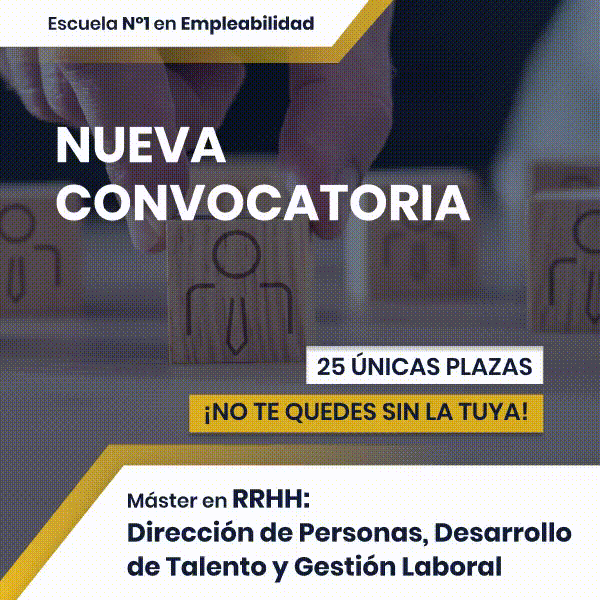Ten Competencies that will make future professionals perform their jobs optimally. Knowing how to use the most effective resources in the place of our work performance provides added value, as well as a decisive differentiation with respect to our competitors.
Knowing how to use the most effective tools in the place of our work performance gives companies the possibility of compete in better conditions. For this, the ten skills considered key by experts (some of them are linked to the global world in which we live - internalization, languages, digital tools, geographical mobility, etc. -, others are related to the trajectory and spirit of the individual - experience, proactivity and initiative , creativity and innovation,...-, others to the ability to adequately interpret any professional challenge -ability to work in changing environments, versatility and functional flexibility, adaptability to change, recycling capacity,...-).
- Knowledge and mastery of social networks.
The globalization has accelerated thanks to social networks. At the same time, they have taken advantage of the freedom of the global phenomenon to further interconnect the public with users, companies, institutions and governments. To live apart from this reality is to live on the margins of any economic, business and, of course, social activity.
Companies have understood the benefits of social networks to boost brand image, improve customer communication, gain visibility and increase social responsibility. The management and mastery of social media environments can be decisive, especially in online business, where communication no longer relies on physical support to promote a purely virtual relationship.
- Geographical mobility.
Large companies, especially multinationals diversify the number of locations in proportion to the markets they access, both at a commercial and manufacturing level. However, it is not a phenomenon that only affects the big ones. The smaller ones also have a lot to say in this area. They increasingly have commercial, purchasing or productive interests in other locations outside their country of origin.
- Experience
Experience is a life marker that summarizes an individual's potential, attitudes and ability to adapt, with guarantees, to a new job. Companies see in this history a clear image that describes the professional's skills and competencies. The goals previously obtained in other performances are a palpable example of an attitude towards work challenges that an interview cannot detect. Professional experience serves, no doubt, to arouse the interest of the future company because it draws clearly and unequivocally the milestones achieved by the professional throughout his or her professional career.
Perhaps the great Achilles heel of experience is the narrow margin that companies set because they demand very competitive profiles that include youth, high training and solid and demonstrable experience.
- International facet.
For Spanish companies, internalization has mutated, since it has gone from being an alternative in a period of crisis to becoming a safe way to grow organically and gain size.
Internationalization has been the result of a turn of events in the Spanish company, spurred by the crisis and turned into a commandment during the recovery. Companies, both large and medium-sized, are looking for a new professional who demonstrates a more global vision of the world and, therefore, appropriate to the current business reality that crosses borders
Nowadays, internationalization has become a new business avenue for the Spanish company who has lost the fear of jumping outside after understanding the extensive benefits it brings.
- Flexibility, work versatility and multidisciplinary ability.
Job versatility or functional flexibility is the ability of a worker to perform different functions, tasks or roles to those expressly assigned to their job. Nowadays it has become a very useful tool to teach that they need to be agile and adapt to new times, especially after the profound restructuring carried out recently by business organizations.
- Relational and communication skills.
The importance of relational and communication skills is capital when it comes to satisfying customer needs. As much or more than the management capacity.
Whether the services are met or even exceeded will depend precisely on the customer's experience and the guidance of human teams internally. the expectations of our clients.
- Adaptability, self-learning and recycling capacity.
Adaptability, self-learning and the capacity for recycling are part of the so-called 'minimum skills' that must make up the professional identity. Personal capabilities, the value of reinventing oneself, the sense of initiative, the entrepreneurial spirit and learning to learn in the face of adversities and challenges in the market must be considered key. In this sense, it relates versatility, flexibility and versatility with “employability and talent”.
For job success, the chameleon people, capable of changing their skin, of adapting effectively to changes, assuming different functions, understanding the social transformations and offer alternativesIn short, to blend in with the environment that surrounds you.
- Creativity and innovation
For most experts, creativity and innovation, that is, the ability to differentiate yourself from the rest, should appear in the 'top of mind' of any professional and businessman, since the path to generate and promote talent is the key to success for the labor market to advance, offer solutions to present needs and anticipate the future.
- Languages
Although the topic of languages and learning other languages has improved in recent years, the truth is There is still a lot to do to compare ourselves to other countries.. -It is “a barrier for which we must continue fighting.”
Currently, mastery of languages, and not just a second language, is considered “something totally necessary” which is why it is positioned as a “Essential requirements. Indispensable requirements”.
10. Ability to work in a changing environment.
Experts warn that the business environment has become more fickle than ever, almost disruptive. In this scenario, stagnation is not forgiven. The saying of renew or die is more valid than ever in professional activity. For this reason, "Training becomes a tool of strategic value”.
In this way, anyone who is not able to adapt their talent to a mutable environment “is dead” and “will lose their internal and external employability,” he adds. The workers have to knowing how to accept change as something permanent that will bring progress but that will force a continuous redefinition, in order to be able to adapt cognitively and emotionally to the new work demands.
Author: José Hueso (Consult HR)
Do you want to be a professional of the future? Come and meet us at the Free Workshop "Work in Human Resources" aimed at Labor Relations and Human Resources, Psychology, Sociology, Pedagogy, Tourism and ADE. RESERVE YOUR PLACE: https://goo.gl/pjXnA3


































